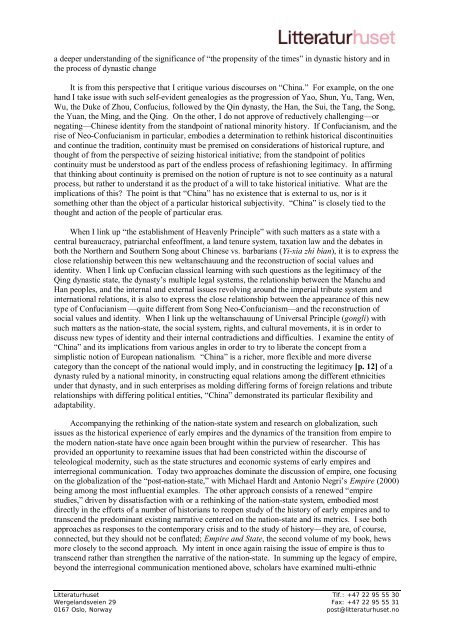20 2011 Opening speech by Prof. Wang Hui ... - Litteraturhuset
20 2011 Opening speech by Prof. Wang Hui ... - Litteraturhuset
20 2011 Opening speech by Prof. Wang Hui ... - Litteraturhuset
Create successful ePaper yourself
Turn your PDF publications into a flip-book with our unique Google optimized e-Paper software.
a deeper understanding of the significance of “the propensity of the times” in dynastic history and inthe process of dynastic changeIt is from this perspective that I critique various discourses on “China.” For example, on the onehand I take issue with such self-evident genealogies as the progression of Yao, Shun, Yu, Tang, Wen,Wu, the Duke of Zhou, Confucius, followed <strong>by</strong> the Qin dynasty, the Han, the Sui, the Tang, the Song,the Yuan, the Ming, and the Qing. On the other, I do not approve of reductively challenging—ornegating—Chinese identity from the standpoint of national minority history. If Confucianism, and therise of Neo-Confucianism in particular, embodies a determination to rethink historical discontinuitiesand continue the tradition, continuity must be premised on considerations of historical rupture, andthought of from the perspective of seizing historical initiative; from the standpoint of politicscontinuity must be understood as part of the endless process of refashioning legitimacy. In affirmingthat thinking about continuity is premised on the notion of rupture is not to see continuity as a naturalprocess, but rather to understand it as the product of a will to take historical initiative. What are theimplications of this? The point is that “China” has no existence that is external to us, nor is itsomething other than the object of a particular historical subjectivity. “China” is closely tied to thethought and action of the people of particular eras.When I link up “the establishment of Heavenly Principle” with such matters as a state with acentral bureaucracy, patriarchal enfeoffment, a land tenure system, taxation law and the debates inboth the Northern and Southern Song about Chinese vs. barbarians (Yi-xia zhi bian), it is to express theclose relationship between this new weltanschauung and the reconstruction of social values andidentity. When I link up Confucian classical learning with such questions as the legitimacy of theQing dynastic state, the dynasty’s multiple legal systems, the relationship between the Manchu andHan peoples, and the internal and external issues revolving around the imperial tribute system andinternational relations, it is also to express the close relationship between the appearance of this newtype of Confucianism —quite different from Song Neo-Confucianism—and the reconstruction ofsocial values and identity. When I link up the weltanschauung of Universal Principle (gongli) withsuch matters as the nation-state, the social system, rights, and cultural movements, it is in order todiscuss new types of identity and their internal contradictions and difficulties. I examine the entity of“China” and its implications from various angles in order to try to liberate the concept from asimplistic notion of European nationalism. “China” is a richer, more flexible and more diversecategory than the concept of the national would imply, and in constructing the legitimacy [p. 12] of adynasty ruled <strong>by</strong> a national minority, in constructing equal relations among the different ethnicitiesunder that dynasty, and in such enterprises as molding differing forms of foreign relations and tributerelationships with differing political entities, “China” demonstrated its particular flexibility andadaptability.Accompanying the rethinking of the nation-state system and research on globalization, suchissues as the historical experience of early empires and the dynamics of the transition from empire tothe modern nation-state have once again been brought within the purview of researcher. This hasprovided an opportunity to reexamine issues that had been constricted within the discourse ofteleological modernity, such as the state structures and economic systems of early empires andinterregional communication. Today two approaches dominate the discussion of empire, one focusingon the globalization of the “post-nation-state,” with Michael Hardt and Antonio Negri’s Empire (<strong>20</strong>00)being among the most influential examples. The other approach consists of a renewed “empirestudies,” driven <strong>by</strong> dissatisfaction with or a rethinking of the nation-state system, embodied mostdirectly in the efforts of a number of historians to reopen study of the history of early empires and totranscend the predominant existing narrative centered on the nation-state and its metrics. I see bothapproaches as responses to the contemporary crisis and to the study of history—they are, of course,connected, but they should not be conflated; Empire and State, the second volume of my book, hewsmore closely to the second approach. My intent in once again raising the issue of empire is thus totranscend rather than strengthen the narrative of the nation-state. In summing up the legacy of empire,beyond the interregional communication mentioned above, scholars have examined multi-ethnic<strong>Litteraturhuset</strong> Tlf.: +47 22 95 55 30Wergelandsveien 29 Fax: +47 22 95 55 310167 Oslo, Norway post@litteraturhuset.no



